Inclement weather (we have snow on the ground, even in the valleys!) and surgery recovery continue to prevent me from photographing birds so today I decided to rerun a favorite older post. This one is actually a combination of two posts that I published eight years ago, in September and November of 2014. For this version I’ve combined the two posts, edited the text and tweaked the formatting.
Vesper Sparrows are “dust bathers”. They do it so often that they’re well known for having puffs of dust fly off of them when they take off. Cornell’s Birds of North America Online, known today as Birds of the World, says Vesper Sparrows aren’t known to bathe in water.
Apparently this one didn’t read the book.
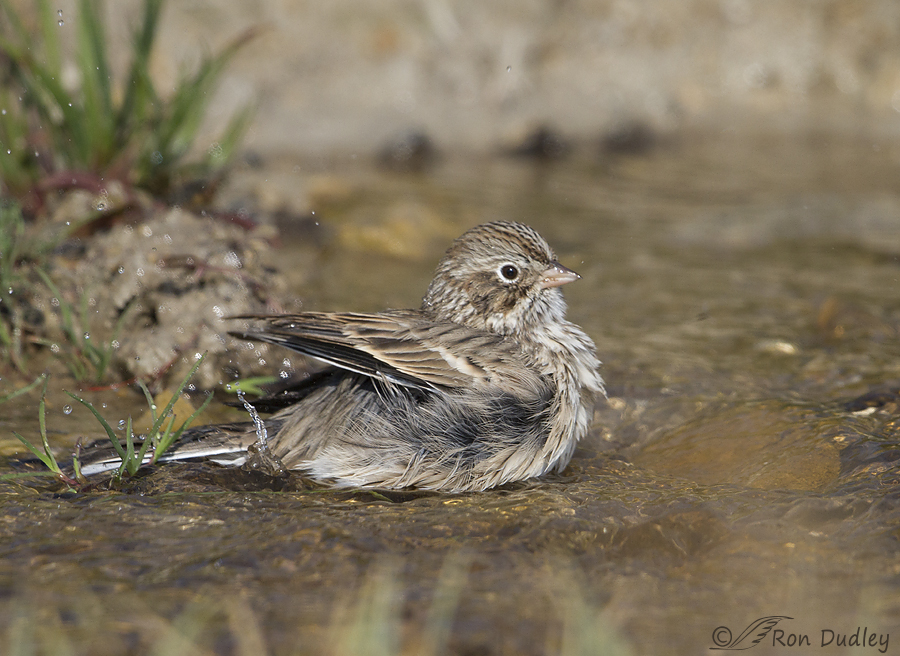
1/3200 f/5.6, ISO 640, Canon 7D, Canon EF500mm f/4L IS II USM +1.4 tc, not baited, set up or called in
When I’m in the Centennial Valley of Montana I sometimes drive the much more isolated North Road as I’m looking for birds. It’s a very long and dusty dirt road but driving it sometimes pays off with raptors of many species. On this occasion my reward was a bathing Vesper Sparrow instead, which we found fluttering around a little spring flowing next to the road.
This bird’s bath began cautiously…
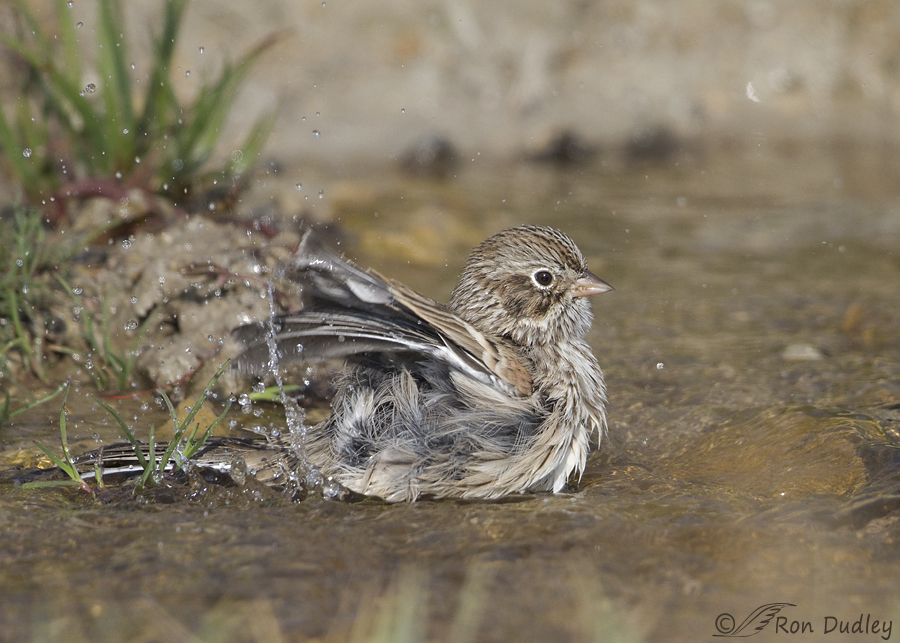
1/2500 f/5.6, ISO 640, Canon 7D, Canon EF500mm f/4L IS II USM +1.4 tc, not baited, set up or called in
but as with most small birds it soon became quite frenetic about it. I was delighted to get a side view, good light and eye contact for much of the performance.
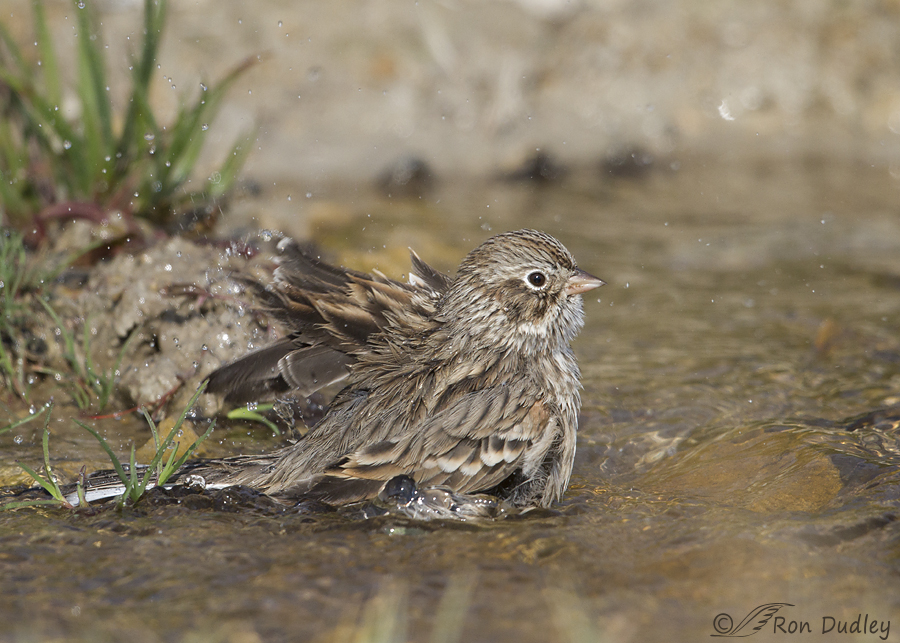
1/2500 f/5.6, ISO 640, Canon 7D, Canon EF500mm f/4L IS II USM +1.4 tc, not baited, set up or called
The sparrow seemed to deliberately fluff its feathers before crouching down into the water to shake,…
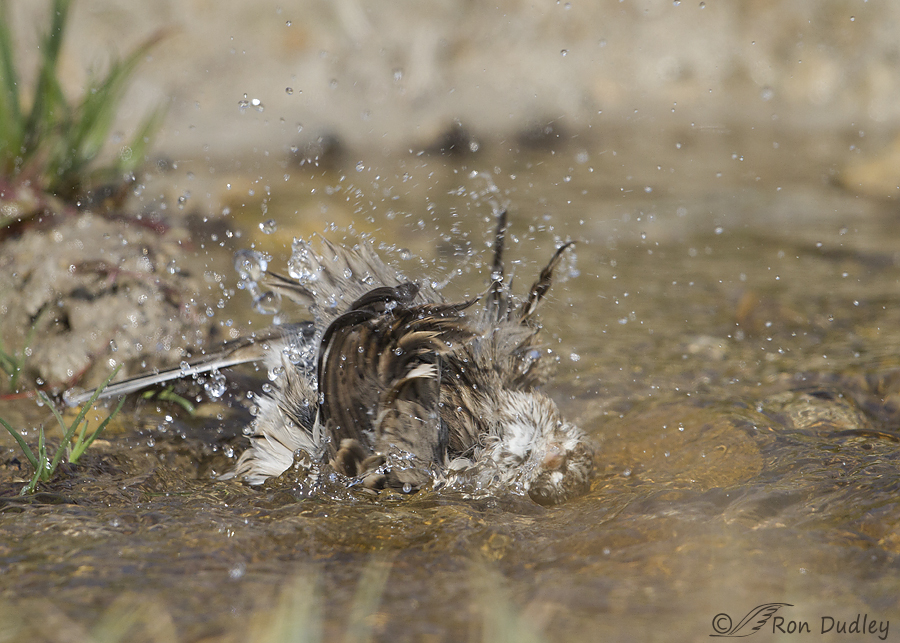
1/2500 f/5.6, ISO 640, Canon 7D, Canon EF500mm f/4L IS II USM +1.4 tc, not baited, set up or called
which makes sense because the feather surfaces would make better contact with the water when fluffed. The bird’s feather and body contortions were impressive.
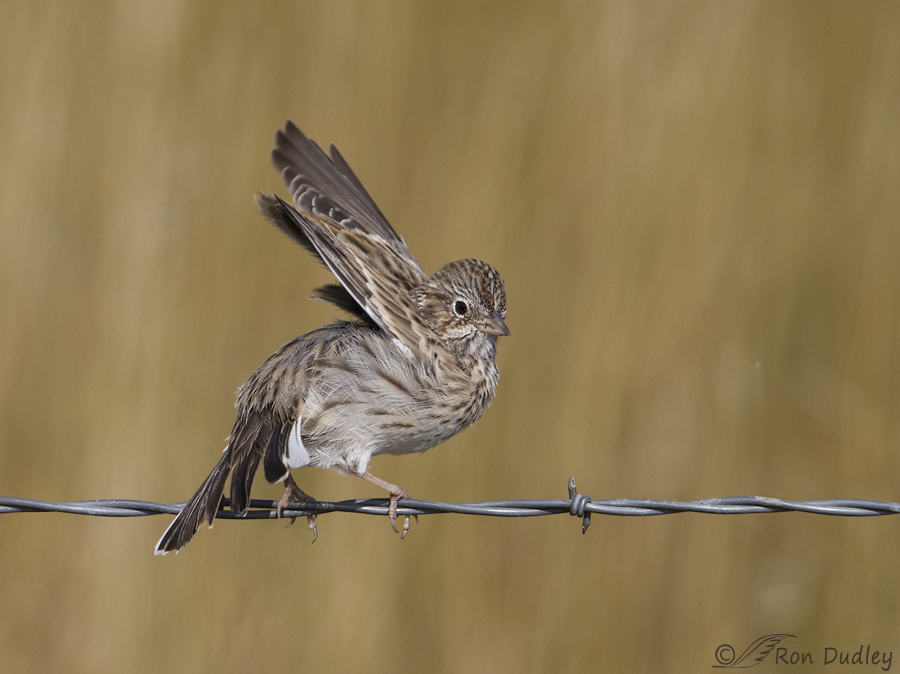
1/3200 f/7.1, ISO 640, Canon 7D, Canon EF500mm f/4L IS II USM +1.4 tc, not baited, set up or called
When the bath was complete the sparrow landed on a nearby wire to shake and dry off in the sun. I thought it was interesting behavior, despite the lack of a catch light in the eye and the shiny and unappealing barbed wire.
I had no idea I’d photographed anything unusual until three weeks later when I was preparing a blog post about the bathing episode. As I often do while preparing a post I did a little research on both the species and the behavior and noticed that Birds of North America Online (BNA), a source I highly respect for its detailed accounts of bird natural history and behavior, said that Vesper Sparrows often take dust baths but are “not observed to bathe in water”. This made me wonder if I might possibly have documented something new so I made a mental note to send BNA a link to my post in case they might be interested in updating their Vesper Sparrow account regarding bathing.
In the meantime, I’d been corresponding with Myrah Bridwell, Permissions Coordinator for Cornell’s Handbook of Bird Biology, on another matter and in the “conversation” I mentioned to her what I’d photographed and sent her a link to the post. Unbeknownst to me, Myrah forwarded a link to my post to Alan Poole, Editor of BNA Online, telling him that I’d “documented a previously undocumented behavior”.
To make a long story slightly shorter, I happened to check BNA’s Vesper Sparrow account yesterday morning (October 1, 2014) and it had been edited. What used to say “not observed to bathe in water” now says “also known to bathe in water (pers. comm. Ron Dudley; images and written account)” and it includes a link to my original Bathing Vesper Sparrow post.
I really deserve no particular credit, other than for being in the right place at the right time and paying attention. As a science teacher for 33 years before I retired, I spent my entire career teaching my students about scientific knowledge gleaned by others and this is one of the few times I’ve ever contributed anything original to that body of knowledge. As small as my contribution might be, it still gives me a lot of personal satisfaction.
Part of the reason for this post is to encourage others to take note of the little things you observe in the field and if you see something interesting that might be new, document and report it. Somewhere. And Birds of the World (BotW) would be an excellent starting point.
BotW is a pay site that requires a membership fee ($49/year or $7.99/month) to access their complete bird accounts but in my opinion that fee is a bargain if you’re heavily into birds.
Ron
Note: If you’re interested, and if you’re already a dues-paying member of BotW, my contribution to their Vesper Sparrow account can be seen here under “Self-Maintenance”.


Sorry I missed this post yesterday but will add my oohs & ahhh now for both capturing these terrific images and adding to the BoTW storehouse of information. I’m impressed that you knew it was a Vesper even when it was wet — I have a lot of trouble differentiating the sparrows and finches when they’re bathing in my fountain or birdbath with such wild abandon! 😉
That’s a pretty cool deal, professor. 🙂
Always great to notice your observations led to amendments in these kind of texts. And it proves that actually knowing what you photograph pays off as well 😉 ! Cheers,
Big smile here! Thanks, Ron. Take care.
Thank you, Ellen.
Excellent post about one of my favorite Sparrows, Ron. I try to teach beginning birders that a Vesper Sparrow is like a Field Sparrow that’s got its “mojo risin’ “. I then sing “mojo risin’, mojo risin’ ” guaranteeing that they will never forget the Vesper Sparrow, and simultaneously guaranteeing that they’ll never ask me to sing again! I only see them in migration, and I’ve never seen one bathe. Thank you for your time and dedication. I love BOTW even more now that I’ve seen your contribution. Kudos!
“guaranteeing that they will never forget the Vesper Sparrow, and simultaneously guaranteeing that they’ll never ask me to sing again!”
I loved that, Diane. You have the natural tendencies of a teacher. A good one.
I am late to the party today but would agree with others. You DO contribute to bodies of knowledge. And have done all your life I suspect. This is a contribution to a ‘formal’ body of knowledge.
And how I love to watch bathing birds. In dust or the wet stuff, they approach their ablutions with such enthusiasm…
“they approach their ablutions with such enthusiasm”
Well said, EC. Perhaps more enthusiasm than any other group of animals.
“one of the few times I’ve ever contributed anything original to that body of knowledge”.
Of course I couldn’t disagree more. Every post is original to me and contributes to my body of knowledge (and many others, I’m sure).
Michael’s comment was spot on and well said.
Lyle, I was referring to “that” body of knowledge but I appreciate the way you look at it too. A lot.
That is very interesting Ron. That’s one of the reasons why your blog is so appreciated for its educational value. If I had come along there and taken photos I would have just thought nice shots of another Sparrow taking a bath. You however had the knowledge that they are dust bathers and what you were seeing might be very different.
Thanks, Everett. Truth be told, I didn’t know that what I’d documented was unusual until I read that entry from Cornell.
Fascinating experience! How wonderful for you to contribute a new finding to the body of global bird studies! Just when you think you’ve seen it all……the world offers a surprise!
“the world offers a surprise”
And a good one at that. Thanks, Kathleen.
Great photos and wonderful to know of your contribution to our knowledge about birds. It may seem small but something previously unknown is very significant and important to our understanding of birds. I’m so glad you could add to our knowledge and appreciation of the world around us.
Thanks very much, Dan.
Ron, it’s so exciting that you contributed to the body of knowledge regarding this charming species. Couldn’t have happened to a nicer fellow. 🙂
It’s not just being in the right place at the right time; it’s also having keen observation skills, a desire to be a lifelong learner, and an understanding of how to share one’s data. Having some wicked photography skills is a plus as well! These are fantastic shots, especially the “all in” and “gotta dry my pits” shots.
Thank you, Marty. I was surprised by how much self-satisfaction I got out contributing to the BotW account of the Vesper Sparrow. Makes me feel like I’ve made a bit of a difference, in a good way.
“Makes me feel like I’ve made a bit of a difference, in a good way.”
In the BotW arena, as in many others!
Thank you Marty. Very kind.
Mike
Discovery is mostly about being in the right place at the right time. Going out into the field as often as you do, being observant, and – to no small credit – getting photo documentation, as well as researching what is known to compare against the observation, is fundamental to science. Take the credit for expanding knowledge. BNA felt so inclined. Congrats!
You put it far more eloquently than I did, Michael. 🙂
“Going out into the field as often as you do”
Or at least as often as I used to, Michael. I hope to get back to my old routine but I’m sure not there yet. And thank you for the very kind words.
Thank you for sharing this wonderful post. Your passion for teaching is heartwarming and I know your contribution to education goes far beyond this single post. Even after major surgery your shared knowledge continues to contribute to all who want to know more. You are a treasure to be appreciated.
Thank you for the very kind words, JK.
WOW! Fantastic post Ron, loved it!!
Thank you, Dick.
Neat! Great to be able to “contribute” to a body of knowledge on the LBJ….. 🙂 It REALLY was into it. Reminded me of our chickens making the dust fly when I had them…… 😉
Have a bit of snow – in theory more to come but also single digit/zero weather next week – know it’s the season BUT UGH!
Judy, this is about the time of year my cousins on the MT farm head for warmer climes for the winter. For good reason.
Great story of how paying attention pays off! A lesson on everyday life.
Thank you, Brett.
So interesting. I do wonder how many other people may have seen one bathing, but were unaware of the “truism.” Good for you!
“I do wonder how many other people may have seen one bathing”
Kenneth, given how many bird lovers there are my guess is that I’m far from the first. The trick is finding out if the behavior is previously undocumented in the scientific literature.